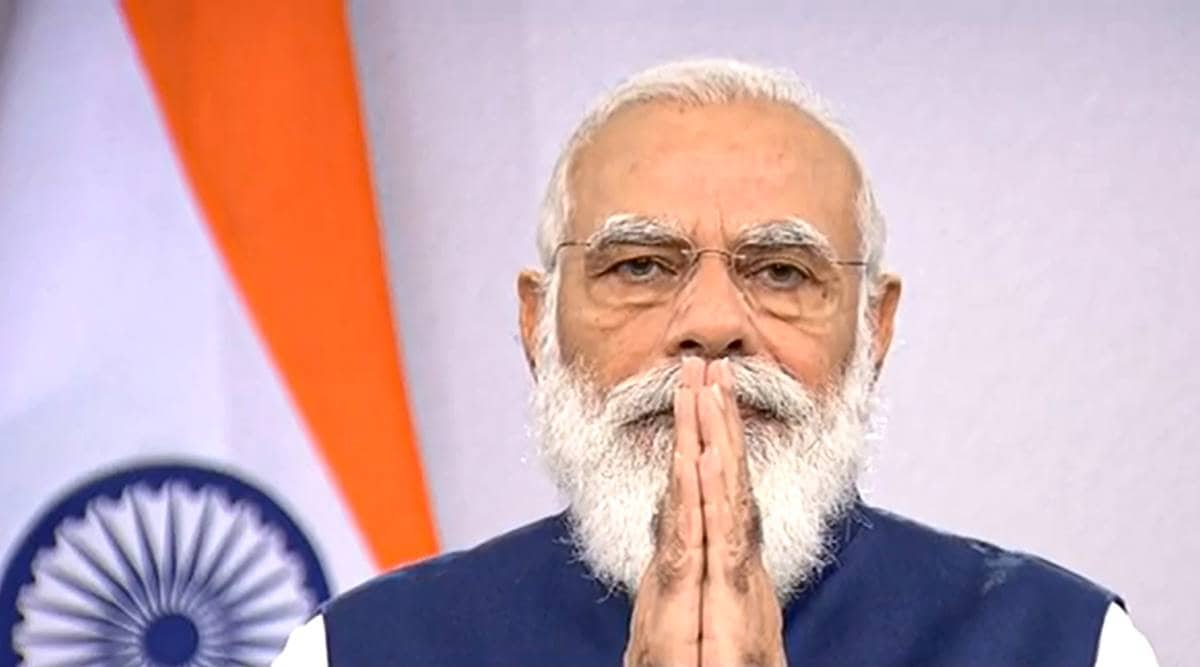
[ad_1]
 Prime Minister Narendra Modi virtually addressed the United Nations General Assembly (DD/PTI Photo)
Prime Minister Narendra Modi virtually addressed the United Nations General Assembly (DD/PTI Photo)
At a time when ties with China have plummeted over the crisis in Ladakh, Prime Minister Narendra Modi took a swipe Saturday at Beijing’s debt-trap diplomacy, saying India strengthens its development partnership without any “mala fide intent” of making a partner country “dependent or hapless”.
He also questioned the UN’s role in the pandemic as he pushed for reforms in the organisation and underlined India’s willingness to assume a larger role in managing the global crisis.
In a veiled reference to China-Pakistan ties, the Prime Minister told the United Nations General Assembly that any gesture of friendship by India towards one country is not directed against any third country.
This is a rare, strong public rebuke by the Prime Minister on China’s debt-trap diplomacy which has come to the fore with President Xi Jinping’s Belt and Road Initiative, especially in India’s neighbourhood.
In a carefully crafted 22-minute speech at the UNGA, the Prime Minister, in a pre-recorded message, said: “Any gesture of friendship by India towards one country is not directed against any third country. When India strengthens its development partnership, it is not with any mala fide intent of making the partner country dependent or hapless.”
He said India has “always thought about the interests of the whole humankind and not about its own vested interests”. This philosophy, he said, has always been the driving force of India’s policies.
“From India’s Neighbourhood First policy to our Act East policy, as well as the idea of Security and Growth for All in the Region, or our views towards the Indo-Pacific region, we have always worked for the interests of humankind, and not driven by our own self-interests. India’s partnerships are always guided by this very principle,” he said.
As the world stares at the aggressive rise of China in the post-pandemic world, Modi said, “When we were strong, we were never a threat to the world, when we were weak, we never became a burden on the world.”
With India due to take the non-permanent member seat at the United Nations Security Council from January 2021 for a period of two years, the Prime Minister assured, “India will always speak in support of peace, security and prosperity.”
He underlined New Delhi’s commitment to the fight against terrorism, but placed it in a broader context. “India will not hesitate in raising its voice against the enemies of humanity, human race and human values – these include terrorism, smuggling of illegal weapons, drugs and money-laundering.”
He also cited the Covid-19 pandemic crisis to make the point that reforms at the UN are urgently needed.
“Over the last eight to nine months, the whole world has been battling the pandemic of the Coronavirus. Where is the United Nations in this joint fight against the pandemic? Where is its effective response? … Your Excellency, reform in the responses, in the processes, and in the very character of the United Nations is the need of the hour,” Modi said.
He reiterated India’s commitment, willingness and capacity to share responsibility on the world stage at a time such as this.
“We have never hesitated from sharing experiences of our development. Even during these very difficult times of the raging pandemic, the pharmaceutical industry of India has sent essential medicines to more than 150 countries,” he said.
“As the largest vaccine-producing country of the world, I want to give one more assurance to the global community today. India’s vaccine production and delivery capacity will be used to help all humanity in fighting this crisis. In India and in our neighbourhood, we are moving ahead with phase-3 clinical trials in India. India will also help all the countries in enhancing their cold chain and storage capacities for the delivery of the vaccines,” he said.
Pushing for reforms at the UN, he said, “One could say that we have successfully avoided a third World War. But we cannot deny that there have been several wars, and many more civil wars. Several terrorist attacks shook the world, and rivers of blood have continued to flow.”
“Whether the character of the institution, constituted in the prevailing circumstances of 1945, is relevant even today? With the changing times, if we don’t change, then the drive needed to bring change will also get weakened,” he said.
“Today, people of India are concerned whether this reform-process will ever reach its logical conclusion. For how long will India be kept out of the decision-making structures of the United Nations?” he asked.
📣 The Indian Express is now on Telegram. Click here to join our channel (@indianexpress) and stay updated with the latest headlines
For all the latest India News, download Indian Express App.
© The Indian Express (P) Ltd
[ad_2]
Source link